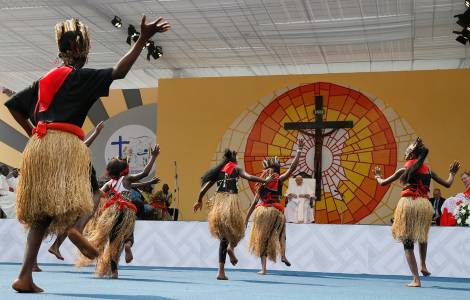
By Gianni Valente
Rome (Agenzia Fides) - "Evangelization" is "a tireless going out towards all humanity" to invite everyone "to the Lord’s banquet". This celebration is that of the "happiness of his Kingdom", the celebration of the "ultimate salvation in the Kingdom of God", which began in time "by the coming of Jesus". A salvation to which everyone is invited, starting from the poor, without excluding anyone. These are the sources and ultimate reasons for the missionary work of the Church recalled this year by Pope Francis in his Message for World Mission Day 2024 (see attachment). The message, published today, February 2, is dated January 25, Feast of the Conversion of Saint Paul, and takes its title from a verse from the Gospel of Matthew: "Go and invite everyone to the banquet" (Mt 22:9).
This year, World Mission Day is celebrated on Sunday, October 20th. In view of this appointment, the Pope, in his message, recalls with particular intensity the universal and eschatological horizon of the apostolic work of the Church, for the eternal salvation of all.
In the text, the Pontiff also thanks all those "missionaries who, in response to Christ’s call, have left everything behind to go far from their homeland and bring the Good News to places where people have not yet received it, or received it only recently". The papal text is also full of reminders and indications to orient the dynamics of ecclesial life in a missionary key.
In particular, Pope Francis, once again recommends to all dioceses throughout the world "the service of the Pontifical Mission Societies", recalling that "the collections of World Mission Day in all the local Churches are entirely destined to the universal fund of solidarity" that the Pontifical Society of the Propagation of the Faith collects and then "distributes in the Pope’s name for the needs of all the Church’s missions". In this year dedicated to prayer, in preparation for the Jubilee of 2025, the Bishop of Rome invites everyone to "deepen their commitment above all to take part in the celebration of Mass and to pray for the Church’s mission of evangelization". And he also recalls that the synodal path shared by ecclesial communities on all continents seeks "to refocus the Church on her primary task, which is the preaching of the Gospel in today’s world".
Go and invite
The common thread followed by Pope Francis to develop his missionary suggestions is the Gospel parable of the wedding banquet. The king sends his servants to the crossroads to invite "everyone you find" to his son's wedding. The two imperatives used by the king, "to go out" and "to invite" - suggests the Bishop of Rome - "express the heart of the mission". Jesus Christ, "Good Shepherd and messenger of the Father", recalls the Pope, "went out in search of the lost sheep of the people of Israel and desired to go even further, in order to reach even the most distant sheep". This is why, the Church of Christ, for her part, "in fidelity to the mission she has received from the Lord, will continue to go to the ends of the earth, to set out over and over again, without ever growing weary or losing heart in the face of difficulties and obstacles". A mission which, following the example of Jesus, can only take place "not by pressuring, coercing or proselytizing, but with closeness, compassion and tenderness, and in this way reflecting God’s own way of being and acting".
The mission for eternal salvation The banquet that the king in the parable wants to share, sending his servants to invite everyone - continues the Pontiff - is like "an image of ultimate salvation in the Kingdom of God, fulfilled even now by the coming of Jesus", who came "in the fullness of time". The Pope recalls that the Second Vatican Council underlined the "eschatological character of the Church’s missionary outreach", when it recalled that "the time for missionary activity extends between the first coming of the Lord and the second…, for the Gospel must be preached to all nations before the Lord shall come" (Decree Ad Gentes, 9).
The first Christians - recalled the Successor of Peter - "sensed the urgency of the preaching of the Gospel". So even today - underlined Pope Francis - "it is important to maintain this perspective, since it helps us to evangelize with the joy of those who know that “the Lord is near” and with the hope of those who are pressing forward towards the goal, when all of us will be with Christ at his wedding feast in the kingdom of God".
Meanwhile, throughout the time of history, which is the time of the Church, "this fullness of life, which is Christ’s gift, is anticipated even now in the banquet of the Eucharist". A foretaste, an anticipation "that the Church celebrates at the Lord’s command in memory of him". Pope Francis quotes Pope Benedict XVI, who taught how "every Eucharistic celebration sacramentally accomplishes the eschatological gathering of the People of God" and who in the Sacramentum Caritatis also recalled the intimate bond between the Eucharist and mission, when he wrote that "we cannot approach the Eucharistic table without being drawn into the mission which, beginning in the very heart of God, is meant to reach all people".
Invite everyone
In the last part of his message, Pope Francis repeats that God, as Saint Paul writes in the First Letter to Timothy, wants "everyone to be saved and come to the knowledge of the truth".
All missionary works are useful only if they facilitate eternal salvation for all. Indeed "everyone, every man and every woman, is invited by God to partake of his grace, which transforms and saves. One need simply say “yes” to this gratuitous divine gift, accepting it and allowing oneself be transformed by it, putting it on like a “wedding robe” (cf. Mt 22:12)". (Agenzia Fides, 2/2/2024)